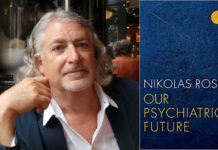Peer-Support Groups Were Right, Guidelines Were Wrong: Dr. Mark Horowitz on Tapering Off Antidepressants
In an interview with MIA, Dr. Horowitz discusses his recent article on why tapering off antidepressants can take months or even years.
When Psychology Speaks for You, Without You: Sunil Bhatia on Decolonizing Psychology
MIA’s Ayurdhi Dhar interviews Sunil Bhatia about decolonizing psychology, confronting the field’s racist past, colonial foundations, and neoliberal present.
Deprescribing Psychiatric Drugs to Reduce Harms and Empower Patients: Interview with Psychiatrist Swapnil Gupta
Ayurdhi Dhar interviews psychiatrist Swapnil Gupta on psychiatric drug discontinuation, drug cocktail risks, patient choice, and the need for trust and transparency.
Demedicalizing Depression: An Interview with Milutin Kostić
Justin Karter interviews Milutin Kostić on the fundamental flaws in depression research and its neglect of human complexity.
The Creation of a Conceptual Alternative to the DSM: An Interview with Dr. Lucy...
MIA's Zenobia Morrill interviews Lucy Johnstone about the reaction to the Power Threat Meaning Framework, her life influences, and her hopes for the future.
Multiplicity and Mad Studies: An Interview with Jazmine Russell
In this interview, Jazmine Russell describes her journey through psychosis and mental health advocacy to embracing a multiplicity of frameworks in Mad Studies.
Psychology is Not What You Think: An Interview with Critical Psychologist Ian Parker
MIA’s Ayurdhi Dhar interviews Ian Parker about critical psychology, discourse and political action, and whether psychology has anything left to offer.
Breaking Academia’s Silence on Inpatient Psychiatry: An Interview with Researcher Morgan Shields
Morgan Shields discussed her experiences in inpatient psychiatry and her efforts to bring patient-centered care to this oft-neglected field.
When Healing Looks Like Justice: An Interview with Harvard Psychologist Joseph Gone
MIA’s Ayurdhi Dhar interviews Joseph Gone about how a history of dispossession, conquest, and colonization shapes mental health outcomes in Native American communities.
Branding Diseases—How Drug Companies Market Psychiatric Conditions: An Interview with Ray Moynihan
MIA’s Ayurdhi Dhar interviews Ray Moynihan about the marketing of disorders, broadening of diagnoses, and harmful treatments.
How Culture Influences Voice Hearing: An Interview with Stanford Anthropologist Tanya Luhrmann
Ayurdhi Dhar interviews Tanya Luhrmann about cultural differences in voice-hearing, diagnosis and damaged identities, and conflicts in psychiatry.
Psychiatry’s Cycle of Ignorance and Reinvention: An Interview with Owen Whooley
Ayurdhi Dhar interviews sociologist Owen Whooley about psychiatry's stubborn perseverance in the face of recent DSM embarrassments and the failures of the biomedical model.
Psychiatry and the Selves We Might Become: An Interview with Sociologist Nikolas Rose
MIA’s Ayurdhi Dhar interviews the well-known sociologist of medicine, Nikolas Rose, about the role psychiatry plays in shaping how we manage ourselves and our world.
Learning a Different Way: An Interview with Maori Psychiatrist Diana Kopua
MIA’s Ayurdhi Dhar interviews Diana Kopua about the Mahi a Atua approach, the global mental health movement, and the importance of language and narratives in how we understand our world and ease our suffering.
Chemically Imbalanced: Joanna Moncrieff on the Making and Unmaking of the Serotonin Myth
Joanna Moncrieff joins Robert Whitaker to talk about her latest book, titled Chemically Imbalanced: The Making and Unmaking of the Serotonin Myth. They discuss the serotonin story and the fact that there is no good evidence that a serotonergic deficiency is a primary cause of depression.
Why Psychosis Is Not So Crazy: A Conversation with Stijn Vanheule
Vanheule urges clinicians to listen for the structure in psychotic thought. He offers clinical examples that reframe hallucinations as a form of creative response to unspeakable dilemmas.
Toward a Critical Self-Reflective Psychiatry: An Interview with Pat Bracken
MIA’s Justin Karter interviews critical psychiatrist and philosopher Pat Bracken about the necessity of challenging received wisdom.
How Grief Became a Disorder and What This Means About Us: An Interview with...
MIA’s Zenobia Morrill interviews psychologist Kaori Wada about what the creation of Prolonged Grief Disorder reveals about our culture and the current status of psychology.
Bringing Human Rights to Mental Health Care: An Interview with UN Envoy Dainius Pūras
MIA's Ana Florence interviews United Nations Special Rapporteur Dainius Pūras about his own journey as a psychiatrist and the future of rights-based approaches to mental health.
Moving Mental Health Work Away from Diagnosis: Sarah Kamens and Peter Kinderman on New...
MIA's Justin Karter interviews two leaders of the Task Force on Diagnostic Alternatives, a group of mental health professionals who have issued an open letter demanding a new look at psychiatric diagnosis.
Fighting for the Meaning of Madness: An Interview with Dr. John Read
Akansha Vaswani interviews Dr. John Read about the influences on his work and his research on madness, psychosis, and the mental health industry.
Feminism, Psychoanalysis and Critical Psychology: An Interview with Bethany Morris
MIA's Micah Ingle interviews Bethany Morris about the psychoanalytic study of film and the history of the "monstrous feminine" in psychiatry.
Uncomfortable Truths in Survivor Narratives: An Interview with Helen Spandler
MIA’s Ayurdhi Dhar interviews Helen Spandler about how psychiatric survivors challenge and change our thinking about mental health.
The Failings of “Mental Health”: How a Seemingly Benign Concept Might be Dangerous
MIA’s Ayurdhi Dhar interviews Bruce Cohen about dismissive psychiatrists, pervasive psychiatry, and the field's ties to neoliberal capitalism.
Rethinking Suicide Prevention: An Interview on Critical Suicide Studies with Jennifer White
MIA’s Samantha Lilly interviews critical youth suicidologist Jennifer White about what suicide prevention could look like outside of the medical model.

































